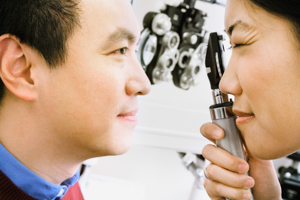Our Health Library information does not replace the advice of a doctor. Please be advised that this information is made available to assist our patients to learn more about their health. Our providers may not see and/or treat all topics found herein.
Topic Contents
Eye Care Specialists
Overview

Ophthalmologists are medical doctors (MDs) who specialize in eye care. Ophthalmology is a surgical subspecialty. Ophthalmologists are licensed by state medical boards to practice medicine and are usually board-certified in ophthalmology. Ophthalmologists are certified to:
- Diagnose and treat all forms of eye disease.
- Prescribe and administer diagnostic and therapeutic drugs.
- Prescribe eyeglasses and contact lenses.
- Treat eye injuries.
- Perform surgery on the eye.
Optometrists (ODs) have at least 3 years of undergraduate science work and may have a 4-year degree. They attend 4 years of optometric college. They are not medical doctors. Optometrists can:
- Diagnose refractive errors and prescribe corrective lenses.
- Detect signs of disease and refer you to an ophthalmologist.
- Administer diagnostic drugs.
- Diagnose and treat eye diseases and prescribe therapeutic drugs (in most states).
- Perform some eye surgery (in some states).
Opticians are skilled technicians. They do not test vision, prescribe corrective lenses, or diagnose or treat eye diseases. Some states require completion of a 2-year training program or a 3-year apprenticeship for a license. Others have no formal requirements. Opticians can:
- Fill prescriptions for eyeglasses and contact lenses.
- Help you select appropriate eyeglass frames and measure the eyes to ensure a proper fit.
- Fit eyeglass lenses into frames.
- Adjust eyeglass frames for comfort and proper lens position.
- Clean and polish contact lenses.
Making the choice
Both ophthalmologists and optometrists can diagnose refractive errors, such as nearsightedness, and prescribe corrective lenses, such as glasses or contact lenses.
Ophthalmologists can diagnose all disorders that affect the eye. They can carry out any medical or surgical treatment.
In a few states, even where they are allowed to administer diagnostic drugs, optometrists are not allowed to diagnose or treat eye disease. They may observe signs of disease and refer you to an ophthalmologist.
On average, optometrists charge less for routine eye exams than ophthalmologists. You may also be able to get an appointment with an optometrist sooner than with an ophthalmologist. Optometrists are more likely than ophthalmologists to offer evening and weekend appointments.
Related Information
Credits
Current as of: October 1, 2025
Author: Ignite Healthwise, LLC Staff
Clinical Review Board
All Ignite Healthwise, LLC education is reviewed by a team that includes physicians, nurses, advanced practitioners, registered dieticians, and other healthcare professionals.
Current as of: October 1, 2025
Author: Ignite Healthwise, LLC Staff
Clinical Review Board
All Ignite Healthwise, LLC education is reviewed by a team that includes physicians, nurses, advanced practitioners, registered dieticians, and other healthcare professionals.
This information does not replace the advice of a doctor. Ignite Healthwise, LLC disclaims any warranty or liability for your use of this information. Your use of this information means that you agree to the Terms of Use and Privacy Policy. Learn how we develop our content.
To learn more about Ignite Healthwise, LLC, visit webmdignite.com.
© 2024-2025 Ignite Healthwise, LLC.



